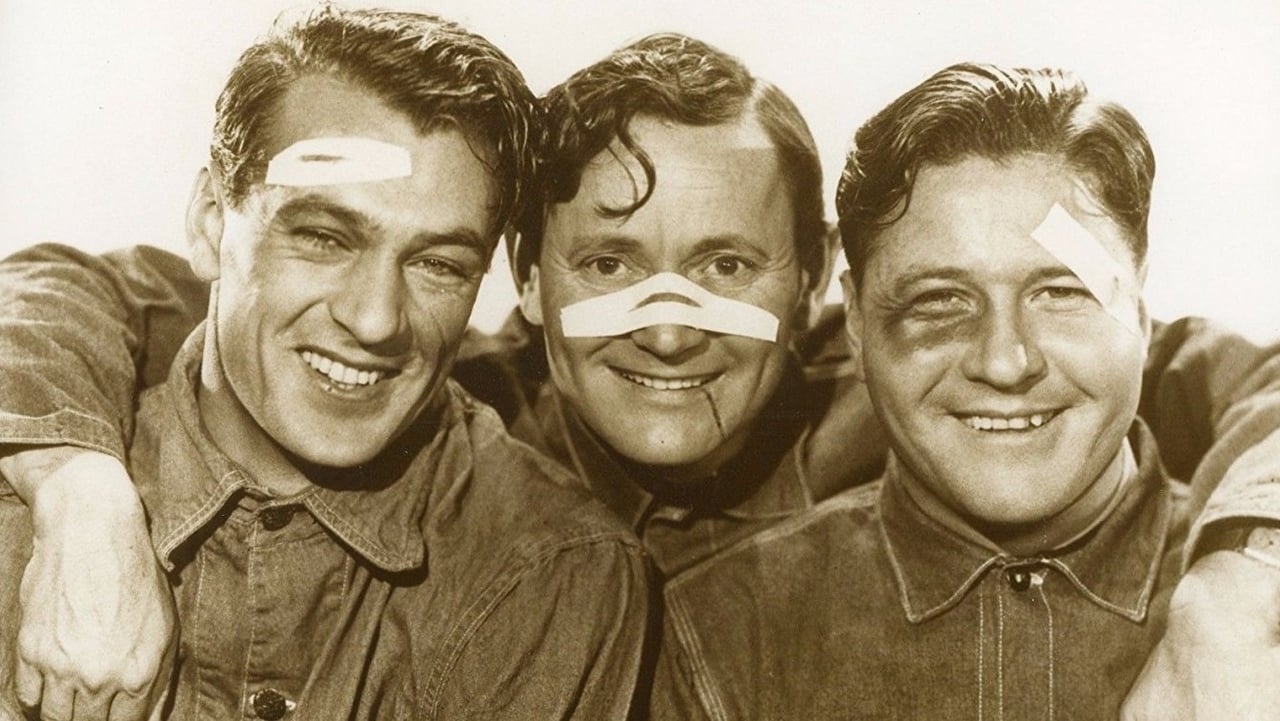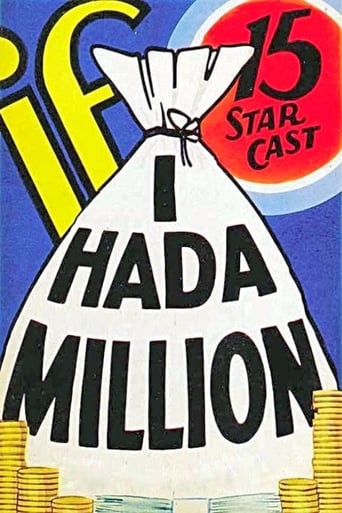

Purely Joyful Movie!
... View MoreA movie that not only functions as a solid scarefest but a razor-sharp satire.
... View MoreThrough painfully honest and emotional moments, the movie becomes irresistibly relatable
... View MoreActress is magnificent and exudes a hypnotic screen presence in this affecting drama.
... View MoreBlowing off the boss who has taken advantage of your services; Vowing revenge on the pigs on the road who cut you off rudely; Getting even for years of protecting an inventory and making it a smashing experience; Baking your pies the way you want and making the patronizing social service people do the rocking; Getting rest in a bed without the presence of a business transaction. That's just some of the goings on in this outstanding multi-story masterpiece, both comic and dramatic, often tragic, sometimes ironic, and in a few cases, quite poignant. It surrounds the estate of steel tycoon Richard Bennett, tired of the family hangers on, the yes men, the red tape and the coddling of well meaning but annoying servants. Seemingly on the verge of death, he pops out of that state and announces without apology that he's going to leave his entire fortune to a bunch of strangers, unaware that they are about to have their lives changed entirely.Some of the segments are better than others, but a few are now regarded as classic. Recipients W.C. Fields and Alison Skipworth decide to get revenge on the road hogs and buy an army of cars to do to them what they've been doing to others. Tired clerk Charles Laughton takes the longest walk to give to his boss what many of us would like to do, although he does it more politely. Nagged Charlie Ruggles is tired of his wife Mary Boland's incessant nagging and takes his revenge out in a glass shop. "Lady of the evening" Wynne Gibson simply does what many of us would like to do when the world closes in on us, and she does it in style. Then there's the final story of the neglected May Robson, an old dear longing for family visits and the chance to make her famous pies again. The well meaning retirement home staff just wants her to relax, and when she gets her bequest, she gets the best revenge of all.Prepare to laugh at times and look on in shock at others, because in this depression era "fantasy", not all dreams come true, and one comes at quite the wrong time. A few triumph, one gets a well deserved rest, and as for Bennett, he finds that a rich man's doctor doesn't always have all the answers. This obviously lead Robson to be cast as Apple Annie in Capra's "Lady For a Night", making her one of the few mature woman movie stars who could handle leading roles in addition to regular supporting roles. Once you see this movie, I guarantee you will never forget it.
... View MoreCopyright 18 November 1932 by Paramount Publix Corp. New York opening at the Rivoli: 2 December 1932. U.K. release: 10 June 1933. 83 minutes.COMMENT: On the whole, the film suffers from the lack of background music, though very occasionally "natural" music does provide a welcome break from the oppressive soundtrack silence. One thing that's not silent, however, are the actors; and, unfortunately, our players here do tend to be over-heavily theatrical — with a few notable exceptions, including Wynne Gibson, Charles Laughton, Joyce Compton and, to a lesser extent, George Raft. Frances Dee has a tiny part, as has Berton Churchill in "The Condemned Man" sequence in which James Cruze (definitely NOT Bruce Humberstone who denies he directed this sequence) makes effective use of Negro singing for background music. Production values are excellent. After a slow start — the Prologue seems to take forever to get to the point which we already know (thanks to all the film's publicity) — we move (in the current television print) to "The China Shop" episode, which is very enjoyable; then on to "The Streetwalker" which, with its wonderful evocation of mood and atmosphere, is one of the film's three high-points. "The Forger" is also an enjoyable episode, as is "The Auto" (though slightly below the usually brilliantly comic standard of W.C. Fields). "The Condemned Man" is a so-so entry. Gene Raymond is miscast, the dialogue is repetitious and we can spot the conclusion right from the start. Fortunately, it's short. With "The Clerk", we have another high-point, thanks both to Lubitsch's masterfully inventive (all the sweeping tracking shots through myriad corridors and up the stairs) yet thoroughly detailed (Laughton making last-minute adjustments to his dress, before the deferential knock on the door of Brown's office) direction and the comic genius of Charles Laughton. "The Three Marines", alas, is the film's really big disappointment. It runs far too long, and neither players nor director are able to do a great deal with a one-line joke that basically misfires. "The Old Ladies' Home" provides a final high point, before a somewhat anticlimactic Epilogue. Another of the film's delights should be mentioned, and that of course is the splendid gallery of support cameos, a list that includes Jack Pennick as the ungainly sailor who even the prostitute rejects in "The Streetwalker", Willard Robertson as a doctor in the Prologue, Samuel S. Hinds as a relative in closing, Tom Kennedy as Tough Joe in "The Three Marines", Fred Kelsey as a prison warder, and Robert Homans as an identification policeman in "The Forger".All told, this is grand entertainment. P.S. A big star in 1932 and 1933, Wynne Gibson overshadows everyone else on Paramount's re-issue posters – even though her name is hilariously misspelled as Wynne Bigson!
... View MoreMr. Glidden, millionaire, is dying. Everyone wonders who will get his money. His relatives hang around the mansion but he keeps changing his will. "I'm dying," he complains, "and I don't know of one man in all the thousands that I employ that's fit to leave in charge of a peanut stand." So he comes up with a great idea: picking people out of the phone book and giving them $1,000,000 each—thus introducing an entertaining series of episodes showing various recipients and how their lives are affected.The episodes vary in tone as well as length; overall it's a mostly lighthearted picture that doesn't overwhelm in any way but does offer a chance to see a number of Hollywood stars and character actors in unique roles:W.C. Fields and Alison Skipworth have trouble with a road hog; Charlie Ruggles has a ball smashing up a china shop; Charles Laughton gives his boss the raspberry. Wynne Gibson is memorable in one poignant story as a rescued dance hall girl who climbs into a fancy hotel bed and tosses the second pillow into a closet. The final story features May Robson trapped in a home for elderly ladies. They won't let her make biscuits, won't allow card playing they won't even let her have a kitten because cats are disease carriers. ("Disease carriers, then why ain't I dead?" Robson retorts. "I've had cats all my life.") It's all pretty melodramatic but made worthwhile by the joyous transformation brought about by Mr. Glidden's gift. Robson is excellent.Richard Bennett is energetic (especially for someone allegedly on death's door) and really quite appealing as the old Mr. Glidden. Also featured in separate stories are Gary Cooper as a Marine and George Raft as a counterfeiter. While it's no masterpiece, it's certainly worth a look, particularly for fans of Fields and Robson.
... View MoreA surprisingly fresh 1932 multi-part comedy-drama; many of the issues it deals with (poverty, faceless mass production, the sadness of old age, even reckless driving!) remain contemporary to this day, nearly 80 years later. My two favorite segments are those with Charles Laughton (in one of his first roles) and Wynne Gibson (whom we actually see in all her lingeried, tattooed glory!): they are short and to the point, sheer perfection. The closing episode, set at a resting home for elderly women, is touching and unusual; the one with the bank forger who can't cash his check is nicely ironic; the one with W. C. Fields and Alison Skipworth features some great car stunts. The weakest - and most overextended - story is the one with the three soldiers who let the check slip through their fingers, but hey, 7 out of 8 hits is still a great score. And mine is *** out of 4.
... View More